Notices
Hosei University Environmental Center Wins "Environmentally Friendly Business Grand Prize" in the 14th Shinjuku Eco-One Grand Prix Contest
- March 23, 2021
- New Students
- Events and Occasions
Hosei University established the "Environmental Charter" in 1999 as a statement and declaration of its determination to solve global environmental problems, and acquired ISO 14001 certification for the Graduate School Building on the Ichigaya Campus, later expanding the scope of registration to the entire Ichigaya and Tama campuses.
In FY2017, we launched the Hosei University EMS, which covers the Ichigaya, Tama, and Koganei campuses and aims to reduce the environmental impact of all activities on campus through a process of continuous improvement based on the PDCA cycle, but effective operation of the Hosei University EMS and student However, the effective operation of the "Hosei University EMS" and the proactive participation of students have been challenges.
Aiming to expand the participation of nearly 40,000 students in FY2019, the Hosei University Environmental Center has conducted the "Hosei University EMS Operation and Management Questionnaire" using the " BASIC" approach used to utilize behavioral insights to solve problems proposed by the OECD to encourage environmentally conscious behavior by working on student awareness. The questions in the "Hosei University EMS Operation and Management Questionnaire" have been substantially revised.
In addition, the Environment Center analyzed the results of the "Hosei University EMS Operation and Management Questionnaire" survey to identify "behaviors that differ from the environmental management program" that hinder the achievement of environmental objectives and targets, and to analyze the causes of "behavioral biases" that hinder the resolution of global environmental issues.
In September2020, the Environment Center developed the "Hosei's Code" campaign, which aims at informational intervention in the process of "implementation" of the environmental management program, in light of "behavioral biases" that hinder the solution of global environmental problems, in a healthy way.
In the "Hosei's Code," Ekopyon taught "Hosei's Code for Paper Resource Reduction," a "mindset" and "rules that must be followed" toward "building a sustainable global society;" "Waste Reduction: Ensure Waste Separation - Hosei University's Code -" and "Hosei's Code for a Healthy Energy-Saving Campus Life" editions were planned.
In addition, before the winter break, we once again asked students, faculty, and staff to cooperate in the "Hosei's Code Extravaganza: Requests from Eco-Pyon for Winter and Spring Break" to reduce standby power consumption, which has a low compliance rate due to "action bias" such as "forgetting (by accident)" or "being troublesome".
In the "Hosei's Code: Extra Edition," we focused on "standby power," which is expected to be effective without significantly reducing utility if focused measures are taken during long vacations from the "Environmental Management Program" to reduce energy consumption as discussed in "Hosei's Code for a Healthy Energy-Saving Campus Life. This is a call to action to focus on "standby power" that is expected to be effective without significantly reducing utility if measures are focused on during long vacations.
At the " 21st Environmental Exhibition" held in November2020, we solicited ideas for overcoming "action bias" that hinders rational decision-making and action, and received numerous innovative submissions related to environmental conservation. In addition, as a special project for "Environment Month" and "World Oceans Day," "Let's Protect the Oceans with Eco-Pyons in 2020" was planned to simultaneously aim at solving issues related to resource conservation, waste, and green purchasing, so that participants can think closely about the relevance of important SDG issues, which are interdependent with their everyday life and each choice. The activity was reported by the participants, who were not only students of the university, but also members of their families, part-time employees, and others who approached the project proactively from various perspectives. The change in awareness was confirmed by the fact that all participants responded that their awareness of global environmental issues had changed.
In recognition of these results, in February2021, the Hosei University Environmental Center won the " 14th Shinjuku Eco One Grand Prix Contest" sponsored by Shinjuku City in the environmentally friendly business category, with the award of "Overcoming Behavior Bias, Eco-Pyon, Healthy, and Global Environmental Problem Solving" for students and faculty members. Hosei University's Code," which aims to solve global environmental problems in a healthy way by overcoming "behavioral bias" among students and faculty members, received the Environmentally Friendly Business Grand Prize.
Global environmental issues are affected by the accumulation of individual actions in university life, and the cooperation of each and every person on campus is important. This year is a special year to ask for your cooperation in preventing the spread of the new coronavirus infection, and we hope that it will encourage many of you to participate in environmental initiatives while leading a healthy lifestyle.
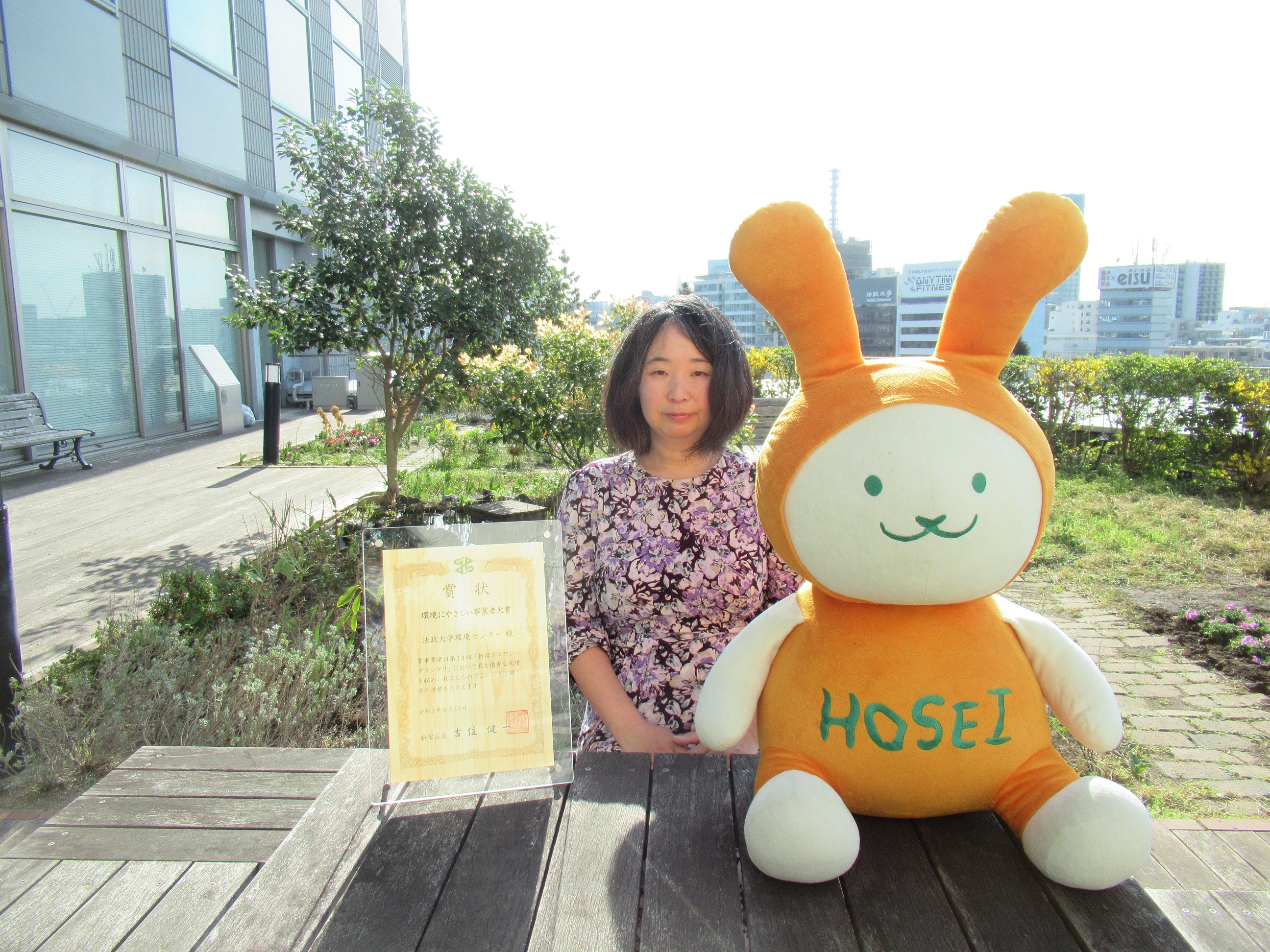
Naoko Enomoto of Hosei University's Center for the Environment, who overcame her "behavioral bias" to plan "Hosei's Code," which aims to solve global environmental problems in a healthy way.
-
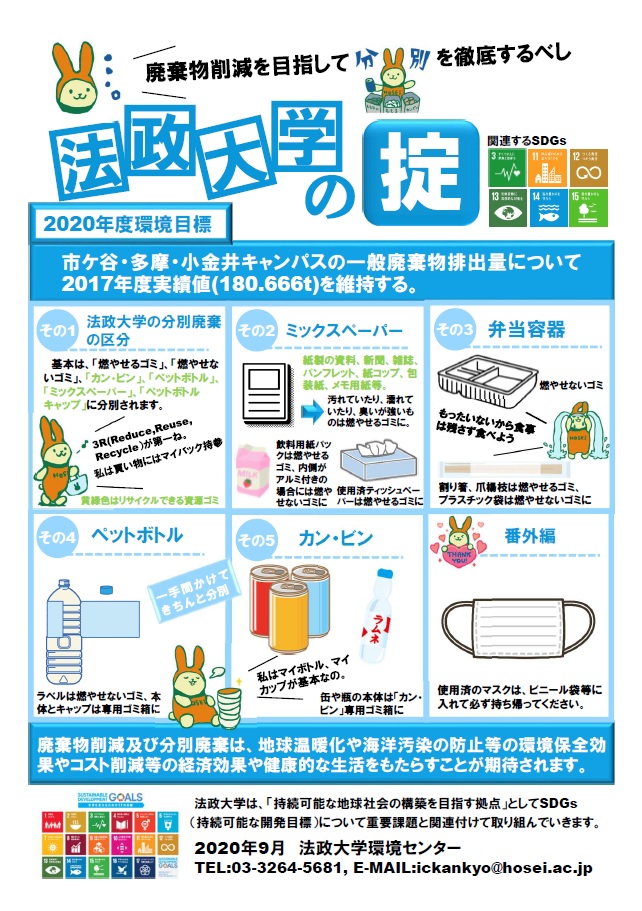
Aiming to reduce waste, we should be thorough in our sorting of waste - Hosei University's Code
-
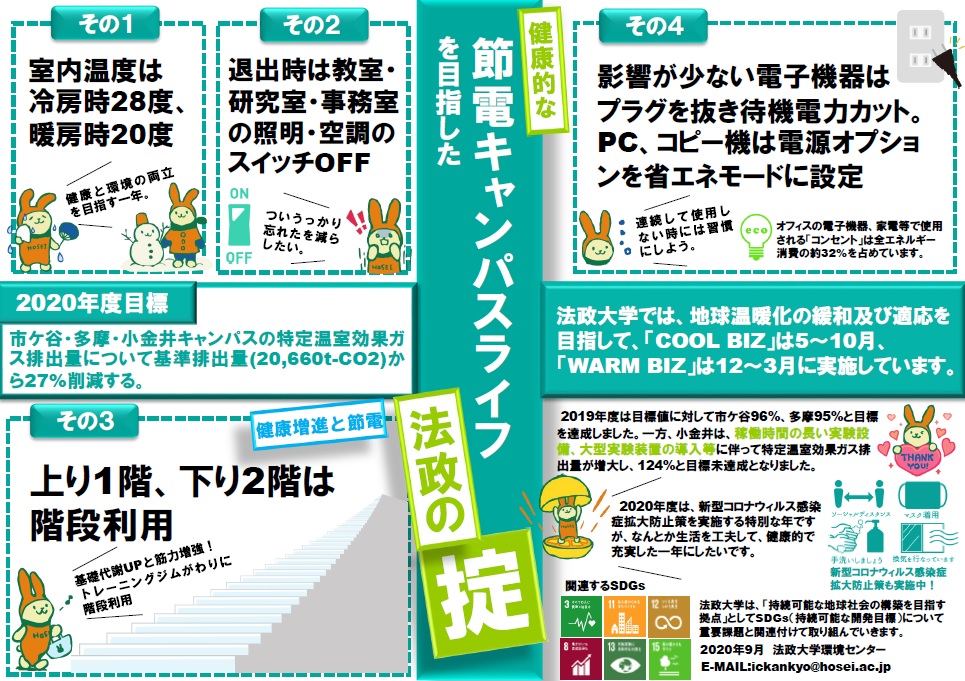
Hosei's Code for a Healthy, Energy-Saving Campus Life
-
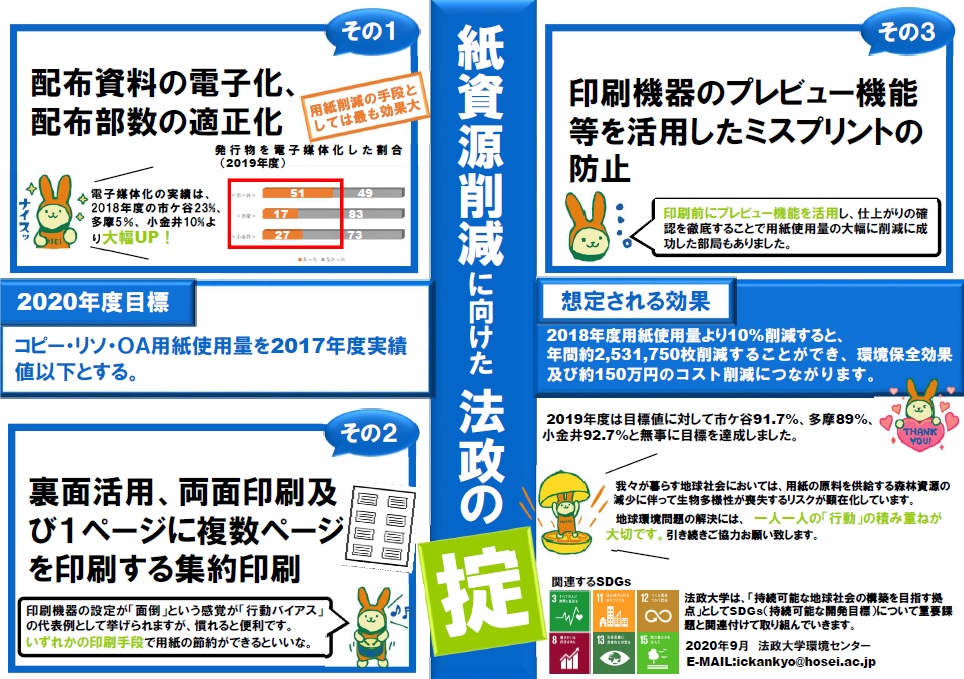
Hosei's Code for Paper Resource Reduction
-
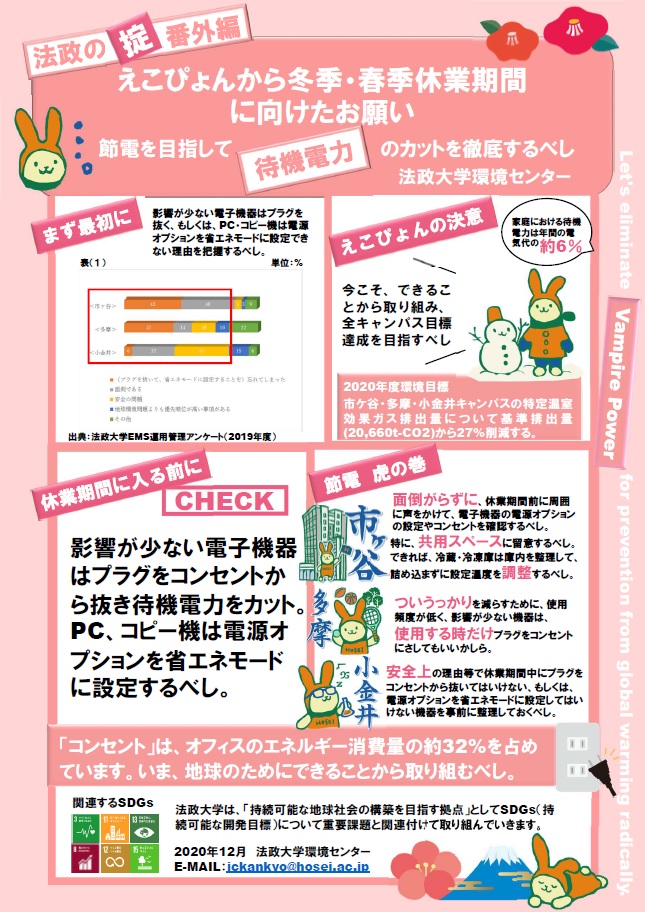
Hosei's Code: Extra Edition "We should thoroughly cut standby power. Request from Eco-Pyon for Winter and Spring Vacation Periods" (in Japanese)
-
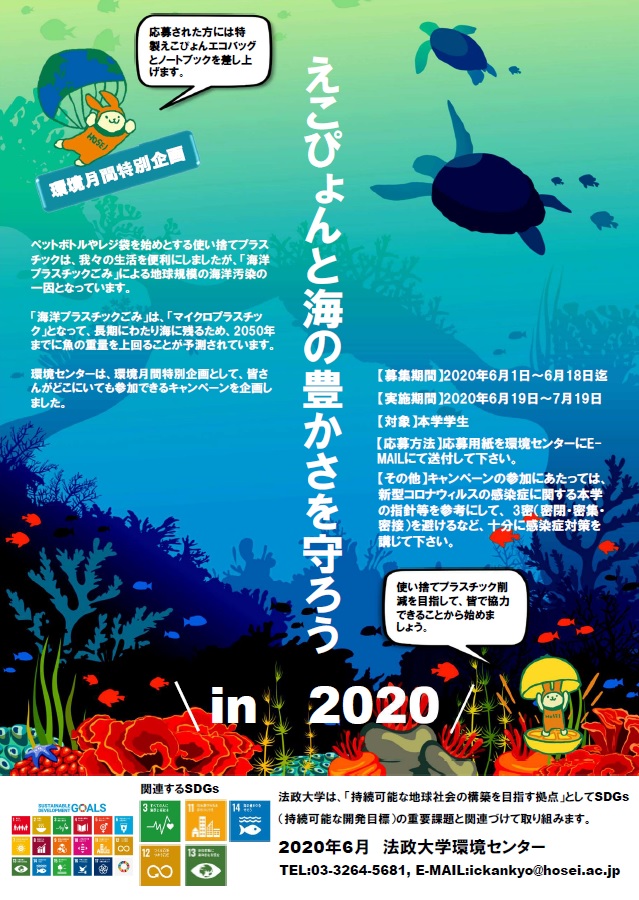
All participants confirmed that their awareness of global environmental issues had changed, leading to a "change in behavior" "Let's protect the abundance of the sea with Eco-Pyon in 2020".
-
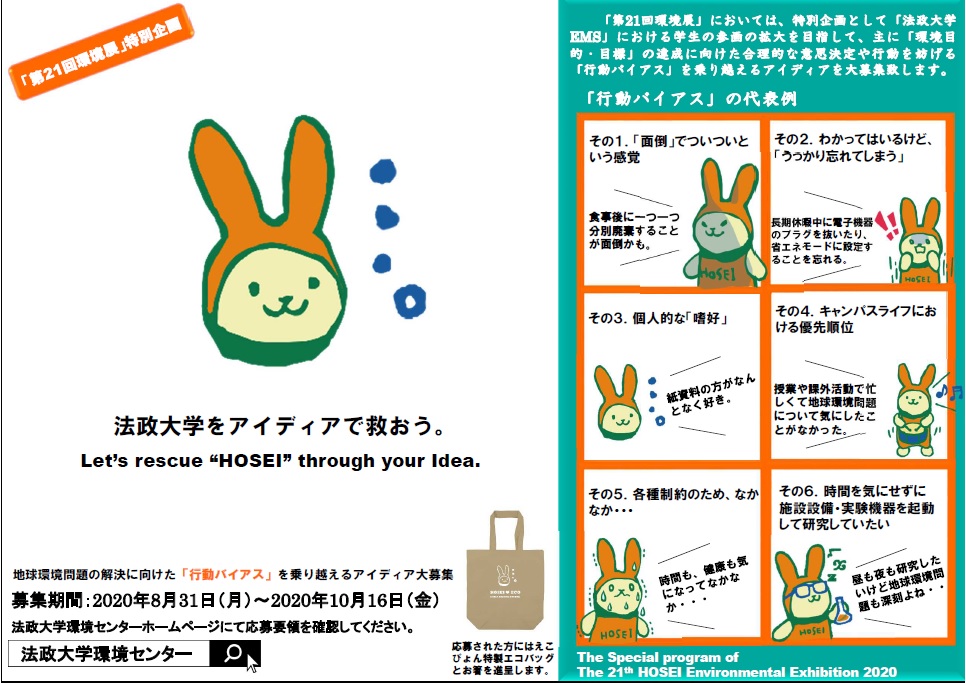
Call for Ideas to Overcome 'Action Bias' to Solve Global Environmental Problems" calling for "saving Hosei University with ideas

